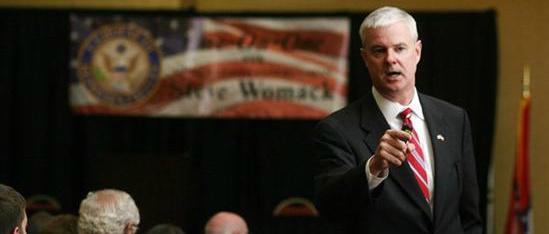New budget chairman Womack wants to fix ‘broken process,’ predicts shutdown won’t happen
by January 10, 2018 5:55 pm 814 views

U.S. Rep. Steve Womack, R-Rogers, who will be installed as the next House Budget Committee chairman, said he wants to fix the “broken process” of federal budgeting and he predicted that a government shutdown will be averted.
In an exclusive interview with Talk Business & Politics from Washington, D.C., Womack said that he will spend his early days as chairman of the powerful committee assessing staff and planning how to end the staccato approach to budgeting that has dogged Congress for years.
“The highest priority that I have, and this is what I told our steering committee last night that made the decision on my selection, is that we’ve got a broken process right now. As I explained last night, the House appropriators on which I serve, finished its work six months ago for 2018 fiscal, and four months ago, the House acted on the floor, and yet we have the government funded through next Friday. That’s a broken process,” he said.
Congress is facing a Friday, Jan. 19th deadline to pass a funding bill to keep government operations running. It’s not the first time that the federal government has faced or encountered a shutdown and President Donald Trump has said previously that a shutdown could be “good.” Disagreement among issues such as DACA, a border wall, military spending and domestic programs have Democrats and Republicans split along partisan and intraparty lines.
Womack contends Congress will find a fix ahead of Friday’s date, but he expects it to be short-term.
“I don’t think there will be a government shutdown. But I’m not optimistic that we will have a catch deal done, so that we can finish the funding of government all the way through the end of the fiscal year,” he said. “My guess is what will happen absent a catch deal, is that we will end up with another two or three weeks CR [continuing resolution] to punt for a couple of more weeks. Again, going back to what we just talked about, this process is not working for the American people. It’s got harsh consequences for some of the people that rely on our budget process to work namely, national security. We are doing untold damage to the people that are asked to defend our country by continuing to run the country on continuing resolution.” As budget chairman, Womack will be inheriting a position tasked with leading members to develop a blueprint to erase a near $20 trillion debt, deficit spending, and infrastructure and program needs combined with tax cuts that could either provide a stimulus or lead to smaller tax collections.
“As a budget chairman, that’s going to complicate matters for me, because we’re going to do everything we can to balance this budget in the 10-year window. Of course, if you’ve got less revenue to deal with, and you’ve got continued funding of the government as we know it today, there’s a gap there,” he said. “We’ll have to figure out how to solve what will be the pay-fors that will go to getting us toward achievable balance in our budget structure. That’ll be my job, and I know it’s going to be unpleasant, and my life is probably going to be miserable at times. But at the end of the day, I came up here to make a difference and put America on a different glide path.”
With Republicans favoring more spending for military programs, Democrats have warned that domestic programs will bear the brunt of the reduced revenue. House Speaker Paul Ryan, R-WI, has said that welfare programs, food stamps, Medicaid and Medicare should be on the table.
“I want to be careful to discern between cuts as you’ve advanced there in your question, and the need for structural reforms so that those programs can have long-term sustainability. There’s a big difference,” Womack said. “When you talk about entitlement reform or welfare reform, or whatever you want to call it, I think our focus is going to be on getting the 20 to 25 million people who are able-bodied and on some kind of government dependence into the workforce, making them productive. There’s going to be a tremendous demand for that labor supply with the cuts that we’ve made in our tax program, and bringing a lot of jobs back to our country.
“I think the way that we’re going to fix America ultimately is making America productive again, and reducing the demand for a lot of these government benefits, and then capitalizing on the fact that we’ve got millions more people into the workforce paying taxes and generating the revenue streams that pay for the programs that are demanded by our public,” he added.
Watch his full interview in the video below.
